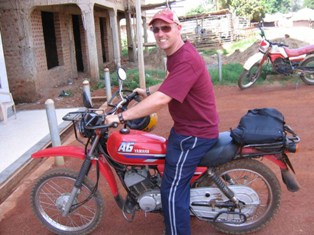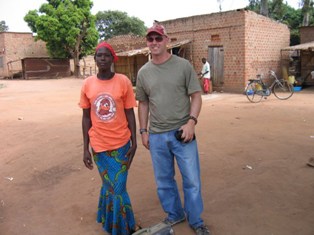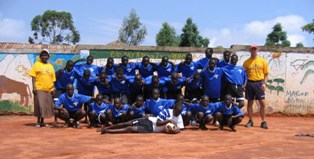Volunteerism in Africa Leads Ravizza to Conduct One-of-a-Kind Youth Sports Study
 |
| Dr. Dean Ravizza uses a motorbike to reach Ugandan villages, where he distributes and collects surveys as part of his one-of-a-kind study. |
SALISBURY, MD---Dr. Dean Ravizza of Salisbury University’s Health, Physical Education and Human Performance Department was conducting post-graduate research in Tanzania in 1993 when the genocide broke out in neighboring Rwanda.
“It happened so suddenly that no one really knew what to do,” Ravizza recalled. “A good friend of mine was the director of UNICEF in Tanzania, and I said, ‘What can I do?’ She said, ‘Do what you do best.’ I scrounged up what little athletic equipment I could find and went in.”
Ravizza organized recreational sports at refugee camps. Though his fieldwork ultimately took him to other countries and continents, “Africa never left my mind.” Perhaps that’s why, in 2005, he turned down a faculty position with Ohio University to spend nine more months in Africa with a UNICEF Sport for Development and Peace partner project. Though he was initially scheduled to work in the Sudan, political unrest there forced the organization to move his assignment to Uganda.
This time, in addition to refugee camps, he also worked with former child soldiers at interim care centers-halfway houses for many rescued children and youth who were abducted and forced into various roles within the rebel group. The centers help them re-assimilate to Ugandan society and their communities in particular while their families can be traced. Organized athletics, Ravizza said, are a useful tool in that process if done properly.
“Sport is very popular among children,” he said. “Now it’s being looked at as a possibility for use in mitigating the causes of conflict in post-conflict areas.”
Ravizza hopes to be part of that process. Today, he and his all-Ugandan research team are conducting the study “The Use of Sport for Children and Youth in Armed Conflict Settings.” His goal is to provide data to local governments and recognized non-government organizations so they may set guidelines for establishing effective community-based programs that involve the use of sport for children and youth in northern Uganda on a larger and more permanent scale.
Dr. Kelly Fiala of SU’s Health, Physical Education and Human Performance Department provides guidance on survey development and the statistical analysis phases of the study. The U.S. Agency for International Development (USAID) has recognized it as the only study of its kind in the world.
The study has captured both national and global attention, with interest from faculty at universities including Harvard, Michigan State and Kennesaw State (Georgia), and an invitation to present key findings at the Seminar for Sport in Post-Disaster Intervention sponsored by the International Council for Sport Science and Physical Education in Berlin, Germany this November. USAID has also approached him about serving as a consultant for sport programming as part of its current peace and stability initiative in northern Uganda.
Recognized by the Office of the President of the Republic of Uganda, Ravizza holds a government-issued Ugandan ID to conduct research within the country and was an invited guest last summer at one of the country’s most prestigious sporting events, the National Secondary School Athletic Championships. He hopes to collaborate with colleagues in the United Kingdom next year to develop results-based workshops to present to local Ugandan governments and outreach organizations in the region on important social issues such as the inclusion of females and the disabled in sports, and pedagogical issues related to meeting program objectives.
Ravizza’s research has led him to meet some interesting people. One member of his research team, a former abductee for eight years, was immortalized as “Moses” in Matthew Green’s 2008 book The Wizard of the Nile: The Hunt for Africa’s Most Wanted. “Moses” now leads the Information for Youth Empowerment Program based in northern Uganda, teaching former child abductees how to use their paramilitary training to make a living in their post-war lives as young adults in addition to his vital role on the research team.
One former child soldier Ravizza worked with had his arm cut off below the elbow in an attempt to prevent him from escaping his military captors. At school, despite his disability, he was voted by his peers the athletics “captain” or coordinator for his class school, not only because of his athletic prowess, but because of his organizational skills-which he developed from his years of abduction in the rebel group.
The long-term study continues to provide insights that support the use of sports as a conflict resolution tool. Data collection, however, can be challenging at times. Ravizza’s team has collected some 411 surveys of children and young adults ages 12-25 throughout the conflict-affected region, all completed by hand and most delivered via motorbike along the country’s primitive terrain. The next step will involve creating case studies to provide more in-depth insight into the topic.
 So what sports are Ugandan youth most interested in playing? “Hands down, the most popular sport, especially among males, is soccer, or what they call football,” Ravizza said, noting that some 89 percent of boys involved in the study cite that among their favorites. Track and field sports are also popular, especially during national championship season, he said. Girls, on the other hand, prefer volleyball and netball, a team sport with origins in the UK and Australia with similarities to American basketball.
So what sports are Ugandan youth most interested in playing? “Hands down, the most popular sport, especially among males, is soccer, or what they call football,” Ravizza said, noting that some 89 percent of boys involved in the study cite that among their favorites. Track and field sports are also popular, especially during national championship season, he said. Girls, on the other hand, prefer volleyball and netball, a team sport with origins in the UK and Australia with similarities to American basketball.
The research and outreach work occupies much of Ravizza’s time away from SU, which has provided funding for the study through the Samuel W. and Marilyn C. Seidel School of Education and Professional Studies; SU Foundation, Inc.; and Center for International Education (UNICEF Uganda has provided logistical support). Since 2005 he has spent a minimum of five and a half weeks each summer working with Ugandan children and leading the research study. His next trip is scheduled in January 2010.
He said the sacrifice, however, will be worth it if it leads to better lives for Ugandan children: “I want this research and data to mean something.”
For more information call 410-543-6030 or visit the SU Web site at www.salisbury.edu.
